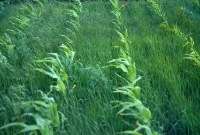
Yale’s Environment 360 reported this little, but very significant, squib a few days ago. Reporting a finding from the just concluded Ecological Society of America, the [article](http://e360.yale.edu/content/digest.msp?id=2538&utm_source=feedburner&utm_medium=feed&utm_campaign=Feed%3A+YaleEnvironment360+%28Yale+Environment+360%29) was headlined, “Scientists Find First Evidence Of GM Crops Reproducing in the Wild.” This is not supposed to happen as these crops are designed to be infertile, requiring farmers to buy seeds every year. I know it’s not kosher to copy stuff more or less in its entirety, but the Yale report is very terse.
Scientists conducting research in North Dakota have found the first evidence of established populations of genetically modified crops in the wild. After testing and photographing 406 canola plants found along more than 3,300 miles of roads, the researchers discovered evidence of transgenic plants in 347, or 86 percent, of the plants. Specifically, some of the crops were identified as Roundup Ready, which are engineered to be resistant to the herbicide Roundup, commonly known as glyphosate; and some were identified as Liberty Link crops, which are engineered to be resistant to glufosinate. In two cases, the crops were resistant to both. “Varieties with multiple transgenic traits have not yet been released commercially, so this finding suggests that feral populations are reproducing and have become established outside of cultivation,” said Cynthia Sagers of University of Arkansas, one of the co-authors of the study which was presented at the annual meeting of the Ecological Society of America. The findings, she said, have significant implications for the ecology and management of native and weedy species and for the management of biotech products in the United States.
Those promoting geo-engineering solutions to climate change should pay close attention to this finding. The undesired outcome here springs from a better understood system than the Earth’s global environment. GMO crops can be put on the market only after a rigorous testing protocol, and still we get unexpected results. The photo shows herbicide-resistant weeds in a corn field that can virtually stymie harvesting. Geo-engineering requires that we take the plunge into the unknown with a minimum of testing at the global scale. Mother Nature is sending us a message with the unexpected crop findings. I hope we will listen carefully.